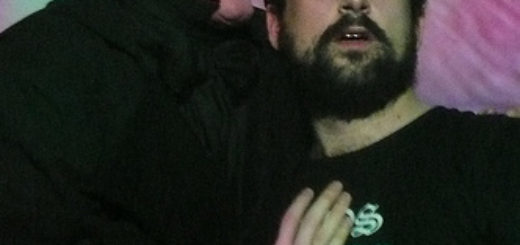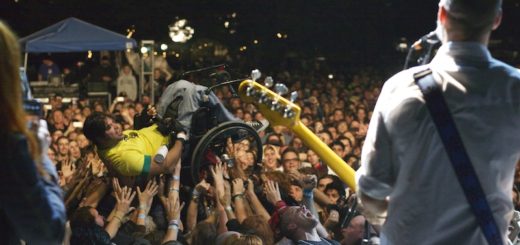Nashville Film Festival: Climate of the Hunter
Nashville Film Festival Coverage via Jason T. Sparks, Our Man in Nashville
There is a difference between the movies one usually sees at film festivals and the movies that usually occupy the multiplex. For the films screened at many independent film festivals, there usually aren’t A-list stars, superheroes or buddy cops.
Something we assume will be present in a festival screened film is a difference in perception on the part of the filmmaker. Our romanticized indie director tells stories in ways the mainstream crowd doesn’t, which can mean just about anything. Unexpected casting choices, non-linear editing, surreal production design—I’ve seen directors make all those choices and then some as a way of saying, “this is not your typical story.” In other words, if you wanted to be curt, cynical, and childish about it, you could say that indie films are different from multiplex fare in that they’re weird, that the indie director goes out of his/her way to be weird, that the indie director’s motto might be a paraphrase of the MGM slogan—Weird For Weird’s Sake. Weirds Gratia Weirdis. (SFX lion roar)
Weird isn’t automatically bad (ask David Lynch), and it isn’t the exclusive provenance of indies (ask Tim Burton or, increasingly, Wes Anderson). I’m merely saying that it’s often part of the film-festival experience. I have now received two helpings of weirdness, at different NIFFs, from a director named Mickey Reece. Last year, it was Mickey Reece’s Alien, in which 1970s Elvis ruminates about fame, destiny, birthright, and whether or not he is in fact the result of an alien sleeping with his mother. This year, it was Climate of the Hunter, the IMDB page for which summarizes it as follows: “Two sisters vie for the affections of a man who may or may not be a vampire.”
I am not denying, nor can deny, the accuracy of that statement. I will say that, much like with the minimal description I found for Long Day’s Journey Into Night 3D, there can be a ponderous gap between “describing what the film is about” and “describing what exactly we’re about to get into here, and what it all means.” There are indeed two sisters—Alma (Ginger Gilmartin), a sculptor and heavy drug user who lives full-time in what is meant to be a vacation cabin in the forest, and Elizabeth (Mary Buss), a DC-based attorney. Theirs is a type of sisterhood common to film, wherein Alma is The Wild Child Who Never Got Her Life Together and Elizabeth is The Straight-Laced One Who Did, But Was Always Less Attractive. The man in question is Wesley (Ben Hall, the strongest performer here), a writer and bon vivant who comes to visit the sisters at the cabin. The film’s drama and narrative push initially come from the interplay and intrigue between the three, but there are also conflicts fostered by three other characters. Wesley is also visited by his son Percy (Sheridan McMichael), a young writer who hates his father, for reasons that become evident as the film unfolds. The sisters are visited by Rose (Danielle Evon Ploeger), Alma’s daughter, who is suspicious about Wesley’s intentions towards her mother and aunt (but still sleeps with Wesley). Likewise, Alma is visited by her neighbor B.J. Beavers (Jacob Snovel, Elvis in last year’s Alien), who shares his (1) pot (2) conviction that Wesley is in fact a vampire with Alma.
Wesley, as the description I shared above put it, may or may not be a vampire, and Reece manages a neat trick in that he gives us basically equal amounts of support for either claim. On the one hand, Wesley sleeps in a black silk robe, laying on his back, his arms folded across his chest like a body at a funeral parlor; he also becomes violently sick if he consumes garlic (leading him, in fact, to cough up what is revealed to be a used tampon), and in at least one brief fleeting scene, has fangs worthy of the late, great Jonathan Frid. On the other hand, there are suggestions that the fang scene is an imagined moment in Alma’s mind, which mind is of great concern to her family—we learn that she had had mental health struggles for years. Also, she spends a lot of this movie high.
What we are eventually faced with is a tug-of-war. On one side, there’s Elizabeth and Rose, who don’t believe there’s anything wrong with Wesley (and are both apparently seduced, and possibly bled, by him); on the other side, there’s Alma and B.J., who suspect themselves to be victims of the classic horror-movie existential malaise, wherein only they can see the monster’s nature. Also on their side, but not as directly involved, is Percy, whose beef with his father is that he’s sniffing around these sisters while Genevieve (Laurie Cummings)—Percy’s mother, Wesley’s wife—is still alive, but institutionalized, catatonically staring out of a window, her lips inexplicably swollen as if filled with collagen—which is how Elizabeth’s lips briefly appear after a late walk outside with Wesley.
What we actually have in Hunter is a good film, something at an intersect between noir and horror and psychodrama. But there are also other things here, things which, while enjoyable, I honestly…I didn’t get them. There, I said it. The film is set in the late Seventies, which gives the production designer an excuse to indulge in the gaudiest of the decade’s clothes and furniture; as a result, the whole thing feels of a piece with Dark Shadows and the “literary” output of V.C. Andrews. Is that meant as irony, or camp? During a scene in the mental hospital where Genevieve is being kept, Percy says he has “brought her a phone”, so she can call him from there—and he pulls from his bag an old-school black Western Electric dial phone. The kind of phone, in other words, that’s useless if not attached to a wall. Is this simply a joke? Is it an attempt to hammer in how eccentric this film is? That’s not to say the phone had no effect—I laughed. Ah, but was I supposed to? Was I also supposed to be amused when (1) asked to read a sample of his own writing, Percy reads to the sisters a few paragraphs of lurid masturbatory porn (2) every time an elaborate dinner is laid out for the sisters and Wesley, an off-screen, never-otherwise-explained voice describes what has been laid out? Also, of course, there’s the whole factor of Wesley coughing up a tampon. What is all that doing in this film?
And, in all fairness, am I overthinking it? Should I perhaps just accept that this is a gothic horror noir which also has big chunks of comedy in it? I wonder if Mickey Reece didn’t grow up watching the British sitcom The Young Ones, much as I did. There’s an episode in which the main plotline is suddenly dropped altogether, to cut to a cheese shop, in which a famous sketch almost occurs, then suddenly doesn’t, and then—cut back to the main plot. Why? Because Ben Elton wanted to do it, that’s why. I loved it, and maybe I should also accept that this is Mickey’s film, and if he wants to flavor his horror soup with a dash of wacky, hey—at least it’s an interesting flavor in a world of fast food.






















